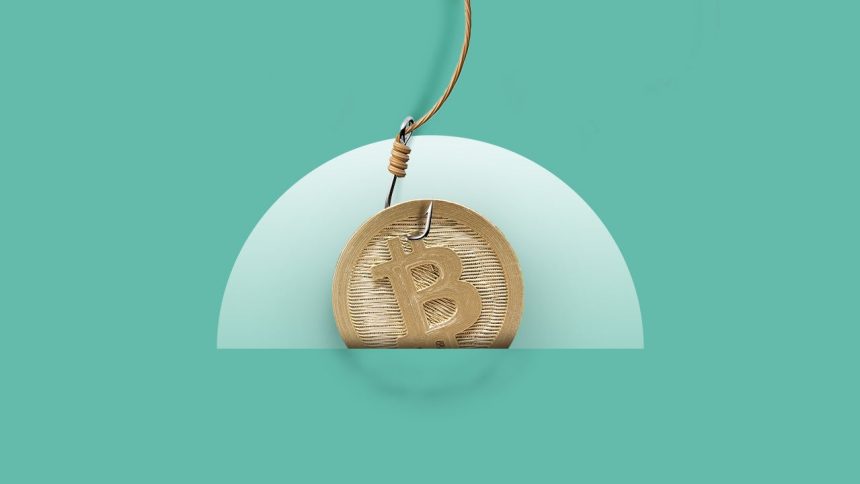Despite the massive volatility in cryptocurrency prices, digital currencies are still incredibly popular. Many still see cryptocurrency as a “get rich quick” scheme, where they can put a few dollars in and take out 10 or 100 times their money, ideally as soon as possible. But that mentality and a lot of misunderstanding around how cryptocurrency works has led to scammers trying to rip off the unwary.
In fact, nearly 33 percent of respondents said they had fallen victim to a crypto scam, according to a 2021 survey by CryptoVantage, a crypto news source. So those looking to trade digital currencies should be careful – even with those who seem to be giving them freebies!
Here are three types of cryptocurrency scams to watch out for – and how to protect yourself.
Top crypto scams to beware of
Crypto scams can take several forms, and it’s important to know how they operate so that you can recognize them when you see them. Working with a financial advisor who’s versed in cryptocurrency can also help you stay away from crypto scams.
Dion Guillaume, global head of public relations and communication at Gate.io, a cryptocurrency trading platform, classifies the most popular crypto scams into three major categories: Ponzi schemes, pump-and-dumps and rug pulls. Here’s how they work:
1. Ponzi schemes
A Ponzi scheme, also known as a pyramid scheme, is a classic scam. In this setup, you’re rewarded for bringing in more people to the cryptocurrency. Any money brought into the scheme is used as payouts for people higher up in the pyramid. When no more victims can be found, the scheme typically collapses.
Guillaume says these kinds of scams are easy to detect and it’s based on how you’re paid: “If a protocol promises you higher returns for bringing in more people, then it’s a textbook Ponzi.”
2. Pump-and-dumps
The evocative naming of this kind of scam reflects how it works and what to expect.
“In pump-and-dumps, malicious groups artificially pump up the value of a token, attracting more investors, before selling off their tokens [dumping] and pocketing a profit,” says Guillaume.
This scam relies on hyping a coin and getting more people to buy into it. As the price rises, insiders sell out of the coin, dumping it on the public and traders are left with worthless coins. Guillaume says to watch out for coins that shoot higher in price in a very short period.
3. Rug pulls
A “rug pull” is a crypto scam where the founders of a cryptocurrency basically just disappear one day and take all their tokens – your money – with them. A well-publicized rug pull happened in late 2021 with the cryptocurrency Squid, and the founders walked off with millions in cash.
A rug pull can be more difficult to predict, because generally you have to trust a coin’s creator, and it may not be obvious that it’s a scam until the creator just walks away.
But one telltale sign may be a crypto coin that restricts your ability to sell it whenever you want. If you can’t get liquidity for a coin, it’s among the worst possible signs.
Watch out for these other common crypto scams, too
Those first three scams are directly related to investing in cryptocurrency, but others – such as the luridly named “pig butchering” scam – try to prey on those who haven’t even begun to invest in cryptocurrency yet. They’re riding the coattails of popular interest in cryptocurrency, though.
This scam “fattens a potential victim with flashy fake direct messages, cars, houses, and photoshopped bank profiles with hundreds of thousands of dollars, hoping someone will give in and send money,” says Joshua Pardhe, senior quant trading at EY.
These kinds of videos are floating all over social media, with scammers flashing thick wads of cash and expensive cars.
“After the victim is captured and money is transferred, the scammer disappears and never communicates again,” says Pardhe.
Another type of scam involves the use of airdropping tokens to supporters of a cryptocurrency. An airdrop basically places tokens in your crypto wallet, and a crypto project’s creators may do so to help grow a grassroots network of supporters, says Alan Eschweiler, the chief operating officer at Stacked Invest, a crypto investing platform.
But when you accept the airdrop, you can expose your crypto investments to a scammer.
“An entity will airdrop you a token that appears to have value, and when you go to exchange that airdrop for another more well-known token, you give a protocol more permissions than you realize,” Eschweiler explains. Then the hacker gains access to the rest of your wallet, he says.
Need an advisor?
Need expert guidance when it comes to managing your investments or planning for retirement?
Bankrate’s AdvisorMatch can connect you to a CFP® professional to help you achieve your financial goals.
Signs that you may have been exposed to a scam
You may not be able to see how a given cryptocurrency operates, and that should be enough to make you think twice about investing your hard-earned money in it. But here are some other signs of a scam. If you see them, you should pay extra careful attention to that crypto.
- Promises of high returns. Pardhe says this is one of the clearest signs of a scam and gives an example of what you might see: “Give me $200 and I’ll give you back $2000 or more, just pay a 10 percent fee.”
- Cars and money. Some scammers appeal to the flashiest products to grab attention. “Sure-fire scams are projects that promise the moon and Lambos. Sorry, there are no moons or Lambos in crypto,” says Mark Fidelman, founder of SmartBlocks, a cryptocurrency marketing agency.
- Grammar errors. Even something as simple as poor grammar on a site or ad can indicate that something is a scam. “If someone is legit, they won’t attempt to market themselves on social media, they’ll have a reputable website, FINRA licensing, and will have proper grammar and no mistakes,” says Pardhe.
- Refusal to share contact details or website info. If a contact refuses to give a website address or contact information to you, you may have a scam on your hands.
- Offers that are too good to be true. “One of the easiest ways to identify a scam is to ask yourself if something looks too good to be true,” says David Pigott, chief risk and security officer at Prime Trust, a fintech infrastructure company. “Are vast returns being offered? Are there elaborate “guarantees” that don’t seem reasonable? Is there an unrealistic urgency to the offer?”
These signs should tip off anyone that they’re looking at a fraud.
How to protect yourself from crypto scams
If you’re looking to invest in a specific cryptocurrency, experts recommend a number of steps that you can take to avoid the scams. In fact, many of these steps require only a modest time investment to prevent you from losing your entire investment to a scammer.
- Conduct your own research. Don’t just trust a pitch from someone. Get out and do your own work to find out if a project is legitimate. Pigott suggests finding reports to see if the crypto platform is working and legit, seeing how developed the platform is and finding how many people are employed by the platform, as well as who the founders or execs are, among other things. Basic research can help you avoid some of the worst actors.
- Crowdsource information about the project. You have a ton of resources available on the web to find out about a given coin, even down to Reddit and X (formerly Twitter). Fidelman suggests answering questions such as “What reputable people have examined it? Did they audit the code?” to simply establish whether a project might be reputable.
- Set up two-factor authentication. Setting up two-factor authentication or multi-factor authentication can help keep your account secure. “It’s a pain for sure, but scammers can easily take over social media accounts if one uses the same password for different services, and then use your profile to scam others,” says Pardhe. “This has happened multiple times in my friend group.”
- Invest in well-known, reputable cryptos. “Invest in a tried-and-tested project that has been around for a while,” says Guillaume. “Or invest in protocol creators who have a track record of creating amazing protocols.”
- Work with trusted partners. “Always go through a known investment firm or take the advice of a trusted friend or family member,” says Pardhe. “Never send money or crypto to anyone, even your friends, unless you double-check with them through another platform.” A reputable financial advisor can help you avoid scams, too.
- Be careful of giving permissions to your wallet. Avoid giving unknown people access to any decentralized wallets if you don’t understand what kinds of permissions you’re offering, says Eschweiler. You could be allowing them access to your crypto assets.
- Verify links for projects. This sounds like basic blocking and tackling, but just checking the links for a project can help you avoid a scam. “Scammers frequently modify URLs by replacing letters to trick users into visiting illegitimate websites,” says Pigott.
- Find reliable media coverage. Positive coverage of a crypto project from a reputable media outlet can help establish the credibility of a crypto project.
These are some of the fundamental steps to protect you and your money from the crypto scammers.
Bottom line
While you may not be able to avoid the cleverest scams, it’s important to not let your greed get ahead of your ability to think clearly. So, it can make sense to follow the most basic rule of avoiding scams: “If it’s too good to be true, it probably is.” But even taking other common-sense precautions can help you avoid some of the worst aspects of the crypto world.
Editorial Disclaimer: All investors are advised to conduct their own independent research into investment strategies before making an investment decision. In addition, investors are advised that past investment product performance is no guarantee of future price appreciation.
Read the full article here















